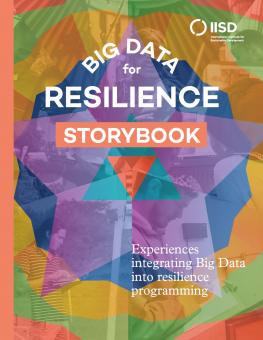
Big Data for Resilience Storybook
The Big Data for Resilience Storybook explores the links between Big Data and resilience building through the experiences of seven international organizations.
The Big Data for Resilience Storybook explores the links between Big Data and resilience building through a new resilience lens.
Aimed at an audience of resilience and development practitioners, the Storybook offers diverse experiences and practice-based recommendations to leverage Big Data’s potential and address its risks as part of efforts to build resilience. The Storybook is a collaborative initiative that features the experiences of seven international organizations working at the intersection of Big Data and resilience in vulnerable settings:
- A Novel Take on Resilience Building: Big Data’s Role in Freshwater Ecosystems – International Institute for Sustainable Development (IISD) Experimental Lakes Area (ELA)
- Enhancing Resilience to Peatland Fire and Haze Hazards: Haze Gazer – United Nations Global Pulse, Pulse Lab Jakarta.
- Strengthening Urban Resilience Through Community-based Mapping: Dar Ramani Huria – World Bank, funded by the UK Department for International Development (DFID) in partnership with Humanitarian OpenStreetMap Team, Tanzania Red Cross, Ardhi University, and the City of Dar es Salaam.
- Informing Resilience Pathways: The Resilience Atlas – Conservation International.
- Combining Small and Big Data to Enhance Resilience in Malawi – Netherlands Red Cross 510 data initiative and EU European Commission Humanitarian Organization.
- Repurposing Mobile Technology to Build Resilience: Mongolia’s Advanced Weather Information System (AWI) – Mercy Corps.
- Unlocking Big Data’s Potential to Strengthen Farmers’ Resilience: The Platform for Big Data in Agriculture – CGIAR Research Program on Climate Change, Agriculture and Food Security (CCAFS).
- VAMPIRE: An Integrated Perspective to Inform Resilience Decision Making – United Nations Global Pulse, Pulse Lab Jakarta..
You might also be interested in
COP 29 Outcome Moves Needle on Finance
In the last hours of negotiations, concerted pressure from the most vulnerable developing countries resulted in an improved outcome on the finance target, with a decision to set a goal of at least USD 300 billion per year by 2035 for developing countries to advance their climate action.
December 2024 | Carbon Minefields Oil and Gas Exploration Monitor
In November 2024, 23 oil and gas exploration licences were awarded across five countries, with Russia granting the licences that account for the largest portion of embodied emissions.
Increased Support Needed to Achieve India's Clean Energy Goals
India is on track to achieve many of its 2030 clean energy goals but needs to step up government support measures to accelerate the deployment of offshore wind, electric vehicles, and green hydrogen, according to a new report.
Budgeting for Net Zero
This study estimates the cost gap for battery energy storage systems (BESSs), offshore wind, solar photovoltaic (PV), electric vehicles (EVs), and green hydrogen (GH2) to inform government support.